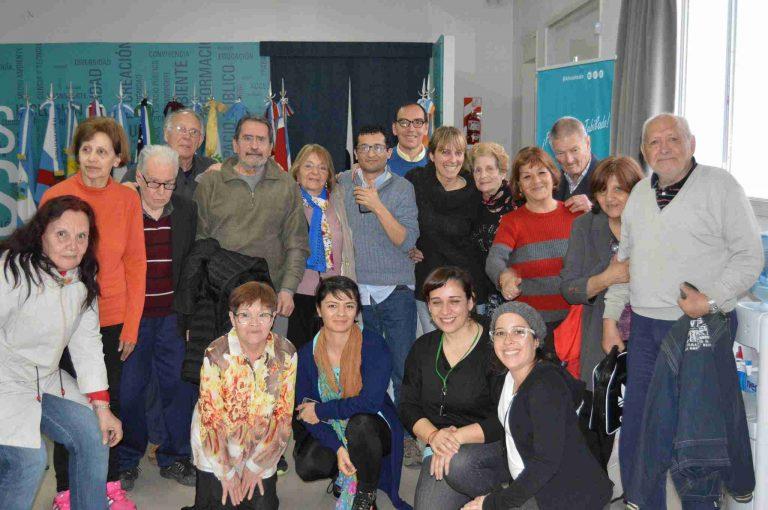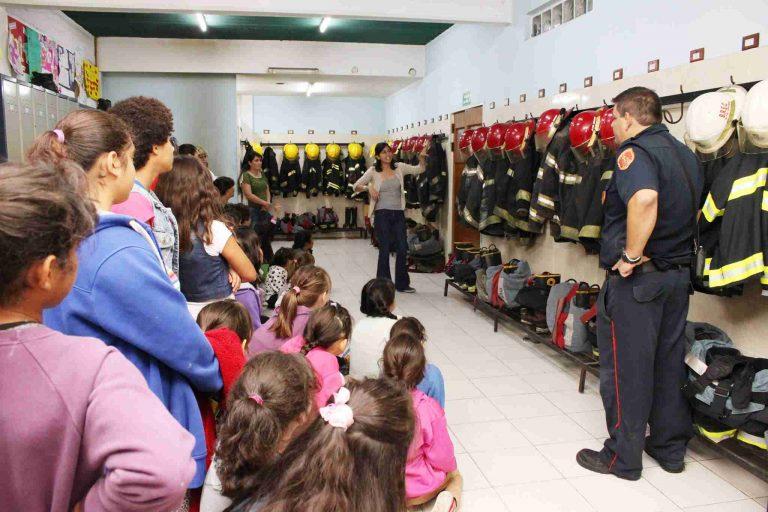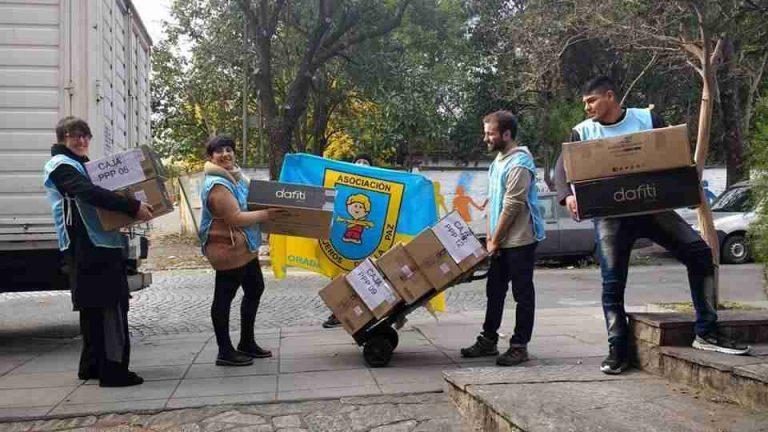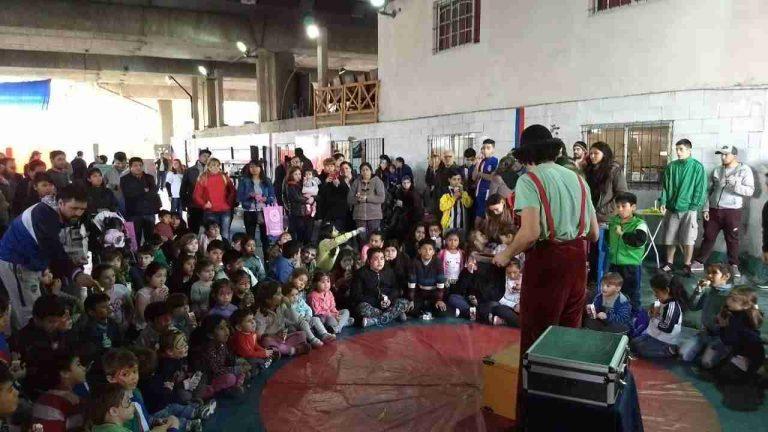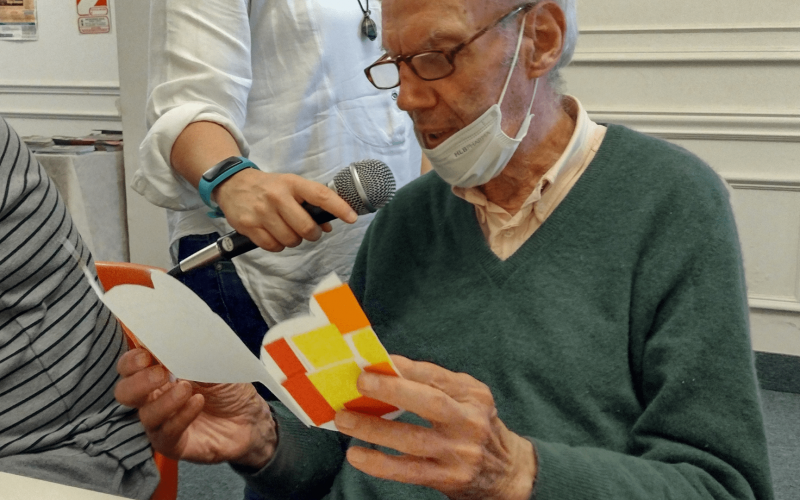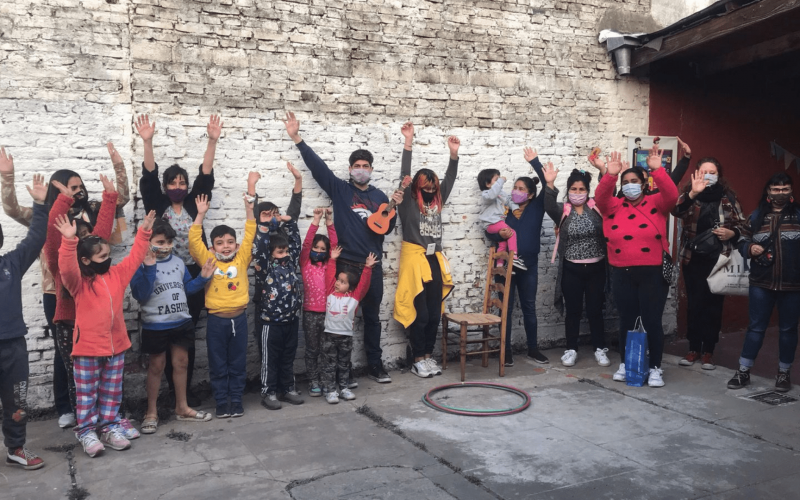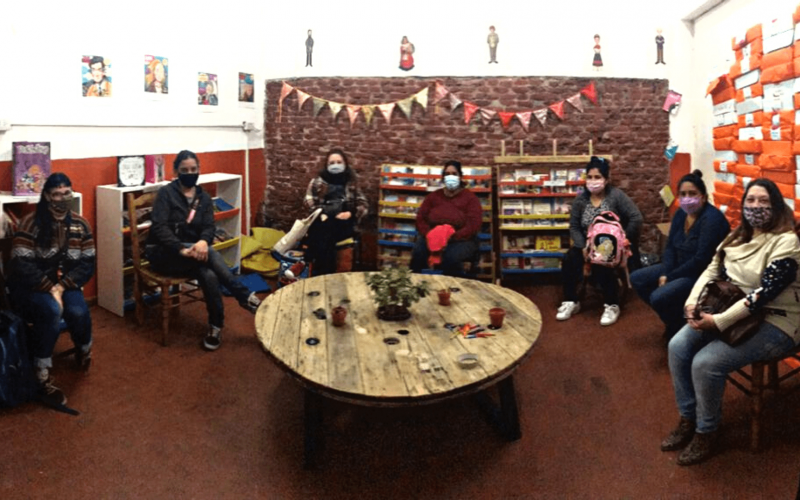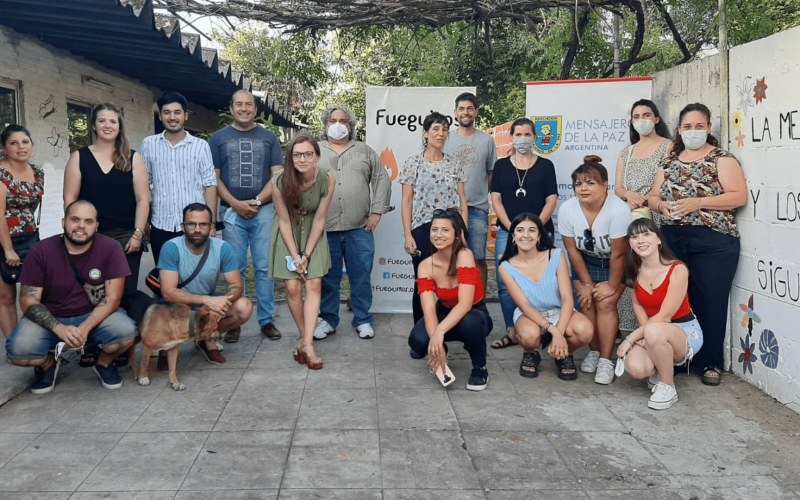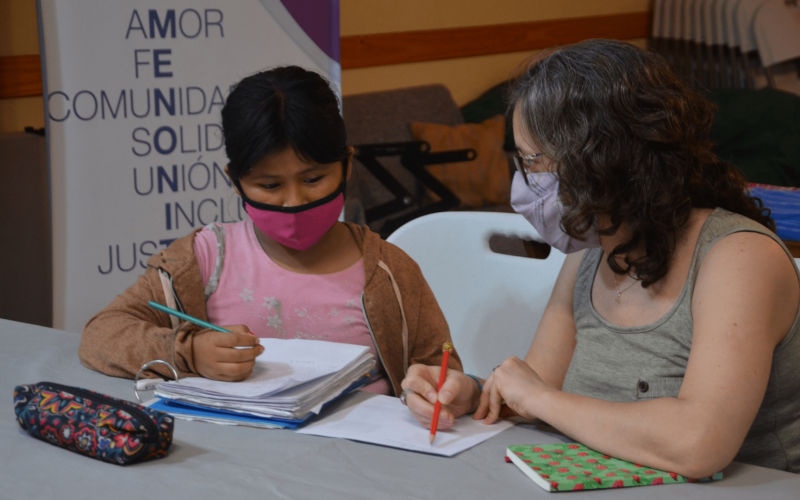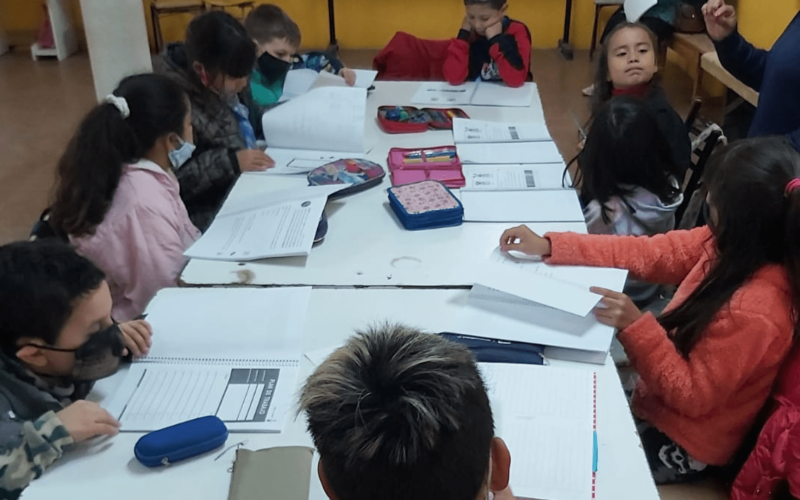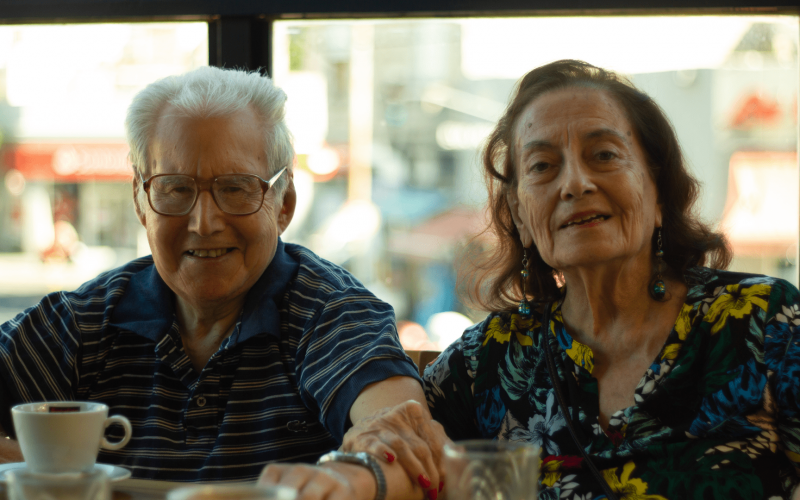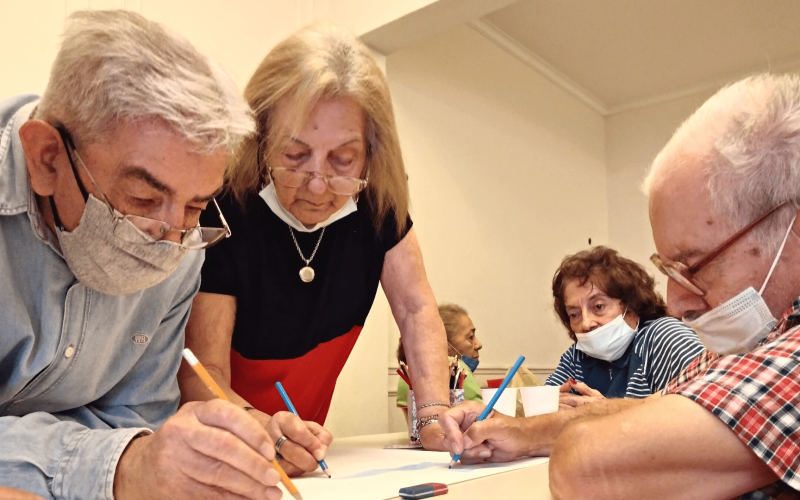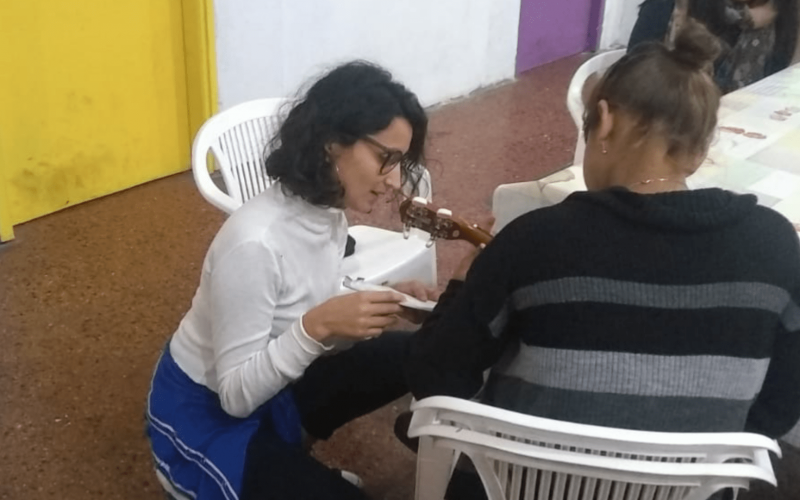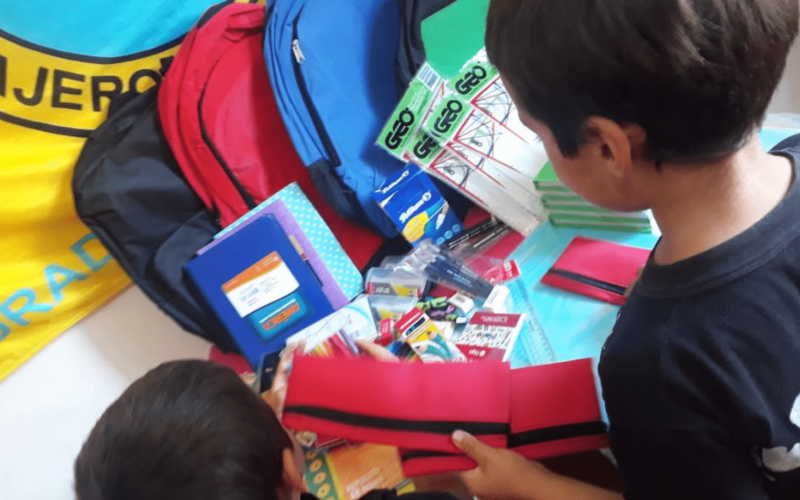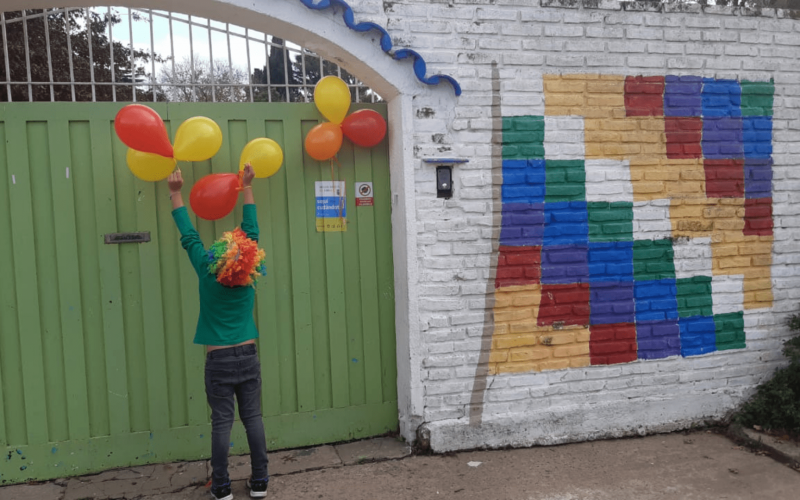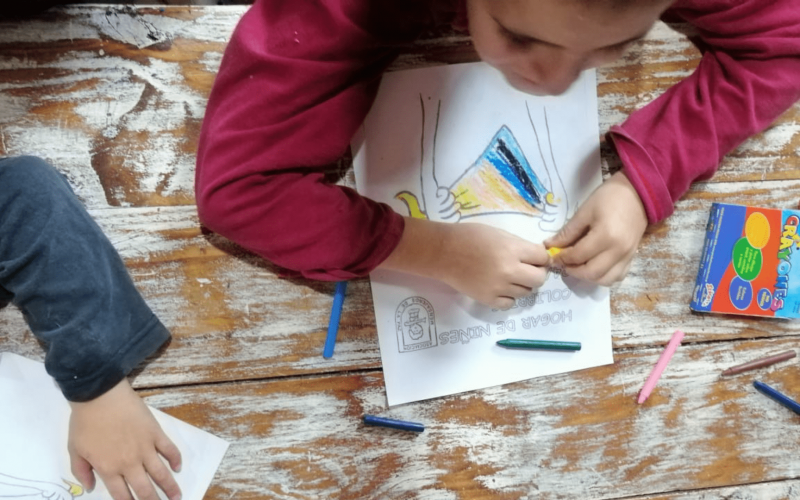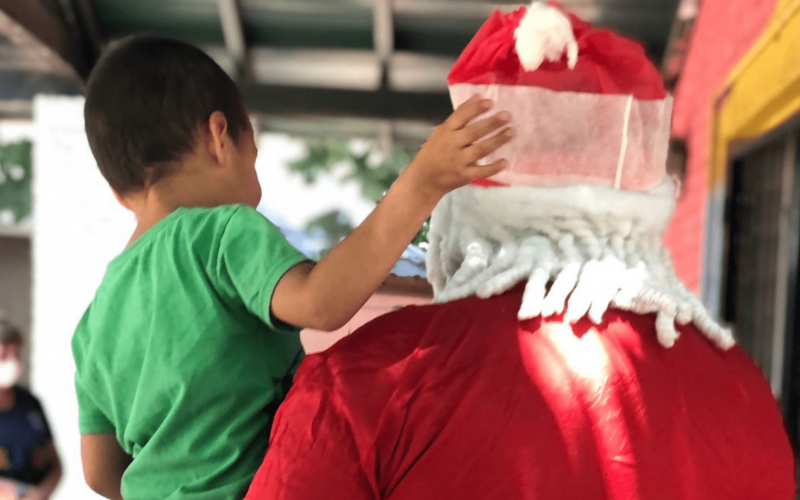LAST GENERAL UPDATE: 06-19-2020
GENERAL CONSIDERATIONS:
- In light of the health emergency in Argentina which is due to the advance of COVID-19, and by virtue of the measures promoted by the National Government to prevent its spread, Mensajeros de la Paz is working in a transverse and comprehensive manner from its 4 programmatic axes, in tune with the recommendations issued by the national, provincial and municipal authorities, aligned with the recommendations of the World Health Organization (WHO).
- To face the health emergency, Mensajeros de la Paz has adapted its work protocols to internal and external audiences and has implemented health measures to protect the community that assists with and attends the Association’s projects.
- The specific protocols of each project are arranged below according to the programmatic axis to which it belongs:
1) Program for the Protection and Restitution of Rights.
2) Community Strengthening Program.
3) Leadership Program for Change and Social Transformation
4) Program for the Promotion and Diffusion of Rights.
- Likewise, a “Home Care Guide for Staff” was produced. Consult the Guide at the following link: https://drive.google.com/open?id=1n4uiGmebXw0_jn2ZnzMyY9ZAtI7cGHS9
- The measures will be updated and can be modified according to the guidelines that are announced by the National Government and the applicable health authorities.
SPECIAL LICENSES (FOR ALL PROJECTS OF THE ORGANIZATION):
- Considering that, on 03/19/2020 through DNU No. 297/2020, the National Government adopted as an exceptional measure the social, preventive and mandatory isolation in order to protect public health,
- which establishes that all persons they must remain in their homes and limit their circulation on public roads from March 20 to March 31 inclusive, which implies refraining from attending their workplaces.
- That, by means of DNU No. 520/20 dated 06/07/2020, the extension of the validity of Decree 297/20 was decreed, until June 28, 2020 inclusive, previously extended by DNU No. 325/20, 355 / 20, 408/20, 459/20 and 493/20.
- The Mensajeros de la Paz Civil Association in accordance with the provisions of article 1, subsections B and C of Resolution No. 207 of the MTEySS dated 03/16/2020, will grant work leave to pregnant workers and workers included in the risk groups defined by the national health authority. These groups are defined in accordance with the aforementioned article, as follows:
- Chronic respiratory diseases: chronic obstructive pulmonary disease [COPD], congenital emphysema, bronchopulmonary dysplasia, bronchiectasis, cystic fibrosis and moderate or severe asthma.
- Heart disease: Heart failure, coronary heart disease, valvular heart disease and congenital heart disease.
- Immunodeficiencies.
- Diabetics, people with chronic kidney failure on dialysis or with expectations to enter dialysis in the next six months.
- However, every institution that provides essential services must ensure the minimum care and protection of those who attend, that is why from Mensajeros de la Paz we ask our workers to provide the greatest commitment, solidarity and common sense to continue carrying out the tasks of assistance to our population, taking the measures and recommendations established in the present protocol.
- Likewise, Mensajeros de la Paz has granted telework or homework to all those who do not perform functions of direct care of children, adolescents and/or the elderly.
GENERAL PROTOCOL FOR ALL PROJECTS OF THE ORGANIZATION
- MEASURES OF ENTRY TO THE CENTER OR RESIDENCE
1. UPON ENTERING, WASH YOUR HANDS WITH SOAP AND WATER
2. CLEAN YOUR SHOES AT THE DOOR (WITH A CLOTH SOAKED IN WATER AND 0.1% SODIUM HYPOCHLORITE SOLUTION).
3. BRING CLEAN WORK CLOTHES IN A CLOSED BAG TO CHANGE INTO BEFORE STARTING THE WORK DAY. DO NOT WEAR THEM ON THE STREET.
4. PUT ON THE COAT, GOWN OR UNIFORM (AS APPROPRIATE) INSIDE THE RESIDENCE / CENTER.
5. STORE THE CLOTHES THAT YOU DO NOT NEED IN A PLACE INDICATED BY THE DIRECTOR OF THE SPACE AND DO NOT TOUCH THEM AGAIN UNTIL THE WORKDAY IS OVER.
6. WASH CELL PHONES AND GLASSES WITH ALCOHOL DILUTED 60-70% (IF CELL PHONE USE APPLIES TO YOUR WORKPLACE).
7. AVOID WEARING EARRINGS, PENDANTS, RINGS, OR OTHER ACCESSORIES.
8. IN ORDER TO AVOID THE CONTINUOUS APPROACH OF THE HANDS TO THE FACE, KEEP THE HAIR TIED.
9. WASH YOUR HANDS AGAIN AFTER YOU HAVE DONE ALL THE ABOVE TASKS.
10. NOW YOU WILL BE ABLE TO START THE TASKS FOR YOUR JOB.
11. BEFORE LEAVING, CHANGE YOUR CLOTHES AND PUT THEM IN A BAG TO TAKE HOME.
12. ONCE CLOTHING IS CHANGED, RE-WASH HANDS TO AVOID CONTACT BEFORE DEPARTURE.
- MEASURES FOR RECEIVING PACKAGES
1. DO NOT TOUCH YOUR FACE AFTER RECEIVING OR GRABBING PACKAGES THAT COME FROM ABROAD.
2. WASH YOUR HANDS WHEN YOU RECEIVE A PACKAGE, FOOD, AND/OR GOODS FOR DELIVERY. YOU HAVE TO BE VERY AWARE OF AVOIDING TOUCHING YOUR FACE SINCE THAT IS THE GREATEST FORM OF CONTAGION.
3. DISCARD THE PACKAGING AND PROCEED TO DISINFECT EVERYTHING THAT IS CONTAINED WITHIN IT. IF IT IS A SUPERMARKET ORDER, YOU HAVE TO DISCARD THE BAGS AND DISINFECT THE SURFACE OF ALL THE CONTAINERS WITHIN IT, EVEN DIFFICULT PACKAGING, FOR EXAMPLE: PLASTIC CONTAINERS, CARDBOARD BOXES AND CANS, AMONG ETC.
4. THIS IS DONE BY SPRAYING THEM WITH EITHER THE 70% ALCOHOL SOLUTION (7 PARTS ALCOHOL AND 3 PARTS WATER) OR THE BLEACH SOLUTION (1% BLEACH: 10 CM3 BLEACH IN 1 LITER OF WATER).
5. WASH YOUR HANDS AGAIN.
6. THE SURFACE WHERE THE PACKAGE OR MERCHANDISE WAS PLACED MUST ALSO BE DISINFECTED. THE SURFACE IS CLEANED WITH DETERGENT AND THEN DISINFECTED IN THE SAME WAY.
REMEMBER THAT THERE ARE THREE MOMENTS FOR HANDWASHINGH: 1. AFTER RECEIVING THE PACKAGE, 2. AFTER OPENING AND DISINFECTING THE PACKAGE, 3. AFTER CLEANING THE SURFACE ON WHICH WE WORK AND PLACE THE PACKAGE.
- MEASURES FOR DISINFECTING SURFACES
- TO MINIMIZE THE RISK OF TRANSMISSION BY CONTACT, THE SURFACES WITH THE HIGHEST CONTACT LEVELS MUST BE DISINFECTED: COUNTERS, RAILINGS, DOORKNOBS, DOORS, TELEPHONES, ETC.
- DISINFECTION MUST BE CARRIED OUT DAILY AND FREQUENTLY, IT MUST BE COMPLEMENTED WITH VENTILATION OF THE ROOMS.
- BEFORE APPLYING ANY TYPE OF DISINFECTANT, THE SURFACES SHOULD BE CLEANED WITH WATER AND DETERGENT.
- FIRST STEP: CLEANING MUST BE DONE WITH A MOP OR CLOTH (WET CLEANING), NOT DRY CLEANING (BROOMS, BRUSHES, ETC.).
- IN A CONTAINER PREPARE A SOLUTION WITH WARM WATER AND ENOUGH HOUSEHOLD DETERGENT TO PRODUCE FOAM. DIP THE CLOTH IN THE SOLUTION PREPARED IN A BUCKET, DRAIN AND RUB THE SURFACES TO BE CLEANED. ALWAYS CLEAN FROM THE CLEANEST TO THE DIRTIEST AREA. REPEAT THE PREVIOUS STEP UNTIL THE SURFACE IS VISIBLY CLEAN.
- RINSE WITH A SECOND CLOTH DIPPED IN A SECOND CONTAINER OF WATER WITHOUT DETERGENT OR
SODIUM HYPOCHLORITE. - SECOND STEP: DISINFECT SURFACES THAT ARE VISIBLY CLEAN.
- PREPARE WITH 10 ML. OF HOUSEHOLD BLEACH IN 1 LITER OF WATER. DIP THE MOP OR CLOTH INTO THE PREPARED SOLUTION, DRAIN AND RUB THE SURFACES TO BE DISINFECTED. LET THE SURFACE DRY.
- CLEANING STAFF MUST USE APPROPRIATE PERSONAL PROTECTIVE EQUIPMENT FOR CLEANING AND DISINFECTION, NAMELY: GLOVES AND CHINSTRAP; AS WELL AS THE NECESSARY UTENSILS: BUCKETS, MOPS, BRUSHES, CLOTHS, LIQUID DETERGENT, DILUTED SODIUM HYPOCHLORITE SOLUTION, DISINFECTANT, WASTE BAGS.
- TO ENSURE AIR EXCHANGE, IT IS HIGHLY RECOMMENDED TO VENTILATE THE ROOMS BY OPENING THE DOORS AND WINDOWS.
SPECIFIC PROTOCOLS PER PROJECT
- PROGRAM FOR THE PROTECTION AND RESTITUTION OF RIGHTS
Centers and Homes for Boys, Girls and Adolescents:
COLIBRÍES (HUMMINGBIRDS) HOME
The Home for boys and girls Colibríes is a temporary home that provides special attention to boys and girls who live in complex situations of violation of rights, and who must remain – temporarily – away from their family environment, under a measure of protection of rights. The objective of this project is to provide a containment space for the population it houses.
In this sense, it was necessary to reinforce the sanitary and social measures aimed at protecting them from this virus. That is why, in accordance with the indications issued by the national, provincial and municipal authorities, and in continuous coordination with the bodies responsible for both childhood and health, the following measures were taken:
General Measures:
- Talks are held both with cohabiting boys and girls as well as with the adults and the adults in charge of their care (activity by Dr. Gabriela Gómez).
- A Crisis Committee was formed. The following roles were assigned: TS Angélica Portela, TS Adriana Vila, (face-to-face role in the home) Dr. Gabriela Gómez (population and personnel health control), Forensic Expert Rocio Ybañez (interaction with the Bromatology and Epidemiology Area of Almirante Brown), TS Karina Sengher (virtual support and spokesperson, liaison with the intervening organizations, family members, etc.), AT Alicia Lazarte and AT Andrea Fernández (Functional and Personnel Coordinators respectively) and Lic. Graciela Gilona, Director of the Home.
- The admission of adults to the home was suspended, other than the personnel necessary for the care of the housed population. The admission of personnel authorized by the pertinent public authorities will be evaluated one by one.
- A telephone line was set up for the authorized relatives to communicate with the girls and boys housed in the home, having communicated to each reference about the current situation and the measures taken as prevention. Said cell phone is a 24-hour on-call phone.
- The internet service was installed and with the computers provided by the Municipality, virtual contacts are made between the girls and boys and those referenced, or between the professional team and the administrative or judicial authorities, by virtue of the enabling of official virtual audiences by control of the legality of the protection measures of the rights of NNyA, or by adoption.
Prevention and Hygiene Measures:
- Upon arrival and before starting their work, all staff will proceed to follow the general protocol for entering the center or residence.
- If symptoms appear that may be compatible with the Coronavirus (COVID-19), the Municipality’s Health Directorate will be notified to activate protocol 107/148 in a preventive manner, in accordance with the protocol for action in the event of suspicion of Coronavirus approved by Joint Signature Resolution 1/2020 dated 04/03/20 of the Undersecretariats of Personal, Family and Community Strengthening and of Health Planning and Network Management. See Annex N ° IF-2020-10838787- GCABA- SSFPFC in the link: https://drive.google.com/open?id=1qHGyv-6aYh9GFiG7ueZNiR8PtepXAx1b
- In case of someone presenting with a fever during the development of tasks at home, the same procedure will be followed, and the person will be placed in preventive isolation immediately until the arrival of the medical team.
- For the purposes of this protocol, any person who presents symptoms according to the definition given by the Ministry of Health of the Nation, which can be consulted at the following link: https://www.argentina.gob.ar/salud/coronavirus-COVID-19/definicion-de-caso
- A routine of personal cleaning and disinfection, hand washing, intensified hygiene of bathrooms and kitchen, hand washing is established when entering the home, even if it is a re-entry.
- In the case of entry of people outside the institution, the professional staff will carry out a survey as a sworn statement, which must be signed by the entering person, in accordance with the model provided by the General Directorate of Children of the CABA, with whom this home maintains an agreement that enables the permanence of children referred by such organization.
- Sharing is suspended, and work is done on new greeting habits and interaction between people.
- Alcohol gel (hand sanitizer) is supplied in the kitchen, and to the coordinators to apply to the girls and boys three times a day.
- Permanent washing and disinfection is carried out with a 70% ethyl alcohol solution and 30% safe water, on all flat surfaces, telephones, curtains, mattresses and bedding, which must also be exposed to the sun.
Home-entry Protocol:
Sequence: Entrance Door —> Staff Restroom —> Clock Room —> Access To Dining Room = Start Tasks.
Black Zone: Entrance Zone
1. The designated person must have the protection elements to carry out the entrance control (mask and eye protection: they can be magnifying glasses, glasses or mask), keys and biosafety kit (alcohol gel, spray with alcohol solution / water, and infrared digital thermometer). Important: before opening the entrance door, remove the biosafety elements (kit) from the clock room and leave it open.
2. The person entering must have a mask on, will be placed on the sanitary mat (soaked with chemical compound: quaternary ammonium, detergents and deodorizers) and the footwear will be cleaned.
3. The designated person will carry out the intervention sequence. It will be positioned in the control area indicated on the floor and will apply the following measures:
First: Take the temperature. “Alarm pattern” 37.5 °C or more, in which case you must immediately notify the management.
Second: spray the alcohol / water solution on the clothing and belongings of the person entering. At this time, the mask is removed (always from back to front), discarded (not reusable) or protected (reusable).
Third: apply alcohol gel to perform dry hand washing. A pedal-operated gel alcohol vending tower was installed.
Grey Zone: Transition Area
- Staff bathroom
4. Change of wardrobe (isolation of street clothes in closed bag) and accommodated belongings (backpacks, purses, handbags, cell phones are accommodated).
Exception: People who do not use public transport may skip this step, but if they must wear the institutional uniform, it is their responsibility to continue with hygiene precautions at home.
5. Apply alcohol gel again.
6. Put on a new mask (stabilizers will be used throughout the day and must be changed every 4 hours in case of getting dirty or wet)
7. Carry out household hand washing: wash with liquid or toilet soap for 40 seconds foaming. Rinse and dry with blotting paper (disposable napkin). With that same role close the tap and then discard.
8. Spray clothing again with alcohol / water solution.
- Clock room
9. Register
10. Clean the fingerprint reader with a wipe moistened with a water / alcohol solution
11. Apply alcohol gel again
White Zone: Access door to dining room
12. Start tasks
Exception for the application of the protocol: On rainy days, the steps of the procedure of the black area are carried out in the gray area (covered gallery). This means that all 12 steps must always be performed.
Home departure procedure:
Gray area = transition area
- Personal bathroom
1) Apply alcohol gel to perform dry hand washing
2) Change of wardrobe (isolation of work clothes in closed bag), the same clothing with which you entered the device will be used.
Exceptions: People who do not use public transport may skip this step, being their responsibility to continue with hygiene precautions at home. But, they do have to remove the institutional uniform.
3) Spraying clothes again with alcohol / water solution
4) Carry out household hand washing: wash with liquid or toilet soap for 40 seconds making a lather. Rinse and dry with blotting paper (disposable napkin). With that same paper, close the tap and then discard.
5) Change the mask
6) Take your belongings
- Clock room
7) Register
8) Clean the fingerprint reader with a wipe moistened in a water / alcohol solution 9) Apply alcohol gel again
10) End of procedure.
Protocol for new entries:
- Receipt of a report on the situation that gives rise to the referred intervention, for the purposes of a first evaluation by the Home Professionals Team, via the mail colibries@mensajerosdelapaz.org.ar or the supervision team.
- The competent authority will be notified of admission of entry and it will be requested that it be guaranteed that the incoming boy or girl has had a stay of 14 days in a place in a situation of social isolation, without the movement of adults or other children and girls, except those who are in their care.
- Provide a COVID-19 test with a negative result, as well as have vaccination against the H1N1 Flu strain 2020 and a daily routine laboratory analysis, complemented with a general medical evaluation that accounts for it and a psychological evaluation updated.
- In the previous stage of entering the home, virtual meetings will be held with the child, in charge of different professionals from the team, where they will work on the activities that take place at home, a sample of the facilities and conversations with other girls, children and adults.
- The agreed day and time of admission must be respected, as there will be a professional assigned to that effect. The people who accompany the child will not enter the home, they will be received by another professional at the entrance door where they will comply with the pertinent administrative requirements.
- At the time of entry of the child, proceed according to the entry protocol, regarding biosafety measures and the disinfection of their belongings.
LA BALSA CENTER
La Balsa is a day and night center for children and adolescents who do not have their basic needs covered, which represents a population at risk even before a pandemic.
Faced with the health emergency caused by COVID-19 and the measures of social, preventive and mandatory, our objective is to guarantee the protection of the health of girls, boys and adolescents who attend the center, who have both the obligation and the right to comply with this measure of isolation.
General Measures:
- Open 24 hours a day
- The readmission modality is no longer spontaneous, to be carried out through representatives of the Council for the Rights of children and Adolescents
- For the purposes of this protocol, any person presenting symptoms according to the definition provided by the Ministry of Health of the Nation is considered a suspected case, which can be consulted at the following link: https://www.argentina.gob.ar/salud/coronavirus-COVID-19/definicion-de-caso
- In the presence of suspected cases of COVID-19, the protocol for action against suspicion of Coronavirus approved by Joint Signature Resolution 1/2020 dated 04/03/20 of the
- Undersecretaries of Personal, Family and Community Strengthening and of Health Planning and Management Online. See Annex No. IF-2020-10838787-GCABA-SSFPF in the following link: https://drive.google.com/open?id=1qHGyv-6aYh9GFiG7ueZNiR8PtepXAx1b
- In no case can a child/adolescent with symptoms be medicated. If they have a fever, only use a cold rag to stabilize their temperature.
- If the child/adolescent intends to leave with these symptoms, they should be persuaded by all possible strategies and interventions not to do so. If the team cannot retain them within the center, it must be coordinated with the management or technical team
Measures to Prevent & Protect:
- Cleaning and hygiene were reinforced in all the centre’s facilities, reinforcing fumigation and disinfection of common and closed spaces
- A strict personal hygiene regiment was applied to the personnel and the population attending this center. It includes:
- Hourly hand cleaning
- The individual use of dishes and any other item that could spread the virus.
- Cleaning of common spaces every 3 hours.
- Kids and adolescents bathe twice a day.
- Change of clothes once you enter the Center.
- A personal hygiene kit is provided to each operator, who is responsible for renewing it every Monday.
- Talks about awareness and prevention of the Coronavirus (COVID-19) are regularly held by professional staff
- Posters and brochures were placed that explain the prevention measures and symptoms that are related to the Coronavirus (COVID-19)
- Any unauthorized person will not be allowed to enter the center, as well as anyone who does not present a certificate of medical fitness and has a justification that merits their essential presence.
- For the reception of merchandise, we will proceed in accordance with the Measures for the Reception of Packages detailed in the section «General protocol for all projects of the organization», as well as the recommendations of the Ministry of Health for the hygienic handling of food. Check in the following link: https://www.argentina.gob.ar/salud/coronavirus/poblacion/alimentos
Home-entry Protocol:
- Upon arrival and before starting their work, all staff will proceed to follow the general measures for entering the center or residence detailed in the section «General protocol for all projects of the organization.»
- Clean footwear on a floor cloth with bleach.
- Change clothes, placing street clothes in isolation in a bag until the time of discharge.
- Put on the chinstrap, which is for personal use. Remember that it must be washed after each watch.
- The chinstrap is mandatory use on the following occasions:
-If for any reason the regulatory distance cannot be respected.
-When handling food (cooking, heating, serving, workshop, etc.)
-When attending the door (even through the peephole) when opening or leaving.
-When writing the report.
-When interviewing kids
-At the changing of the guard.
- Respect hygiene measures and distances of 1.5 meters between people.
- Upon discharge, they must change their clothes again, placing the work clothes in a closed bag.
Protocol for New-entries:
- The following are conditions for the admission of new kids and adolescents
-Taking the temperature, having to present a medical certificate stating with the signature and registration of health personnel, that the child has a temperature lower than 37.4.
-Attach a certificate signed by personnel registered in the health area, which also includes the registration number of the signer, specifying a negative swab or reactive test result for COVID 19. (attach result)
- Two operators will make the entry, who must carry out the inspection of the child’s/ adolescent’s belongings, if there are three, one will remain in the room.
- Once the review has been carried out, the belongings will be placed in a closed bag, and an operator must disinfect them within the operators office.
- The child/adolescent must shower regardless of the time of admission.
- Once admitted to the La Balsa Center, the youth must comply with the mandatory quarantine period within the center. In case of non-compliance, the Center reserves the possibility of refusing the re-entry if an isolation is not fulfilled that allows ensuring the absence of COVID in the re-entry.
Centers and Homes for the Elderly:
MENSAJEROS DE LA PAZ DAY CLUB
The Adult Day Care Center of Mensajeros de la Paz is a community for day care, which opens from 9 AM to 5 PM assisting elderly people (60+) who are in isolation, loneliness or other situations of social violation. They participate in activities that promote and stimulate active aging.
Because the care provided by the center is mainly for the population most vulnerable to this virus, the recommendations and measures implemented by the national authorities, as well as the WHO and PAMI, have been followed in order to provide greater protection and security to our attendees.
You can see PAMI’s recommendations and suggestions at the following link: https://www.pami.org.ar/pdf/residencias_y_centros_de_dia.pdf
General Measures:
- As of 03/16/2020, the Day Club remains open from Monday to Friday from 9 a.m. to 5 p.m. (usual hours) to provide containment in the cases that warrant it. Professionals are in their normal hours as well as kitchen and cleaning and hygiene staff.
- Between 12 noon and 12:30 pm, food is delivered. It will be delivered only on Monday, Wednesday and Friday, this in order to avoid the daily departure of the attendees. On Mondays, lunch is delivered on Monday and Tuesday; on Wednesday that of Wednesday and Thursday; and on Friday.
- The entrance to withdraw is four people and they go one to one to wash their hands, physical contact is not allowed and they must maintain the recommended distance.
- An alcohol gel dispenser was placed at the entrance, in the middle and at the end of the dining room.
- Liquid soap with antiseptic and disposable towels with the corresponding basket were placed in each bathroom.
- The surfaces of tables, desks, chairs, handles, doorknobs, etc. are cleaned with diluted hypochlorite in water, as well as floors and walls.
- Information and awareness posters for the virus were placed in visually strategic places.
- A technological channel was enabled to provide support and social containment through telephone call, text message and whatsApp.
- The WhatsApp group called «Mayores whatsappiando» was created, which serves as support, containment and information. Professionals, workshops, participants (who have a cell phone) and family members (in cases of cognitive impairment). This group works also the order of.
- The affidavits of the elderly who attend the Day Club are taken.
- By virtue of compulsory social isolation, as of March 25, the modality of delivery of food at home. On Mondays, Wednesdays and Fridays from 11:30 a.m. to 2:00 p.m., lunch is brought to those older people who cannot approach the day club due to mobility difficulties and who do not have a relative or neighbor who can remove the food for them
- The interdisciplinary team carries out the exercise of transferring the activities that were carried out daily in the physical space of the Club to the places where the elderly live, through the WhatsApp application.
- The development of the workshops takes place from 10.30 am to 11.30 am. distributed by day as follows: Monday: Socio-affective Workshop. Tuesday: Yoga Workshop. Wednesday: Memory Workshop (cognitive stimulation). Thursday: Meditation Workshop. Friday: Artistic / Creative Workshop.
- For those older people who do not have technological means, we look for the way that the activities arrive in writing as far as possible and in accordance with the workshop.
Measures for the delivery of food at home:
- Preparation: The tupperwares and trays are disinfected with sodium hypochlorite before filling each container. Gloves are used to handle food and are discarded each time a different surface is touched. For desserts, disposable jars are used that are previously disinfected.
- Packaging: The food is placed in a closed bag (which will be later discarded), and it is transferred inside a refrigerator, which is disinfected before and after each delivery.
- Transfer: Only two people per car, a driver and a delivery man in the back seat.
- During the delivery tasks, we try to sanitize the hands with alcohol gel before taking the food bags, when re-entering the vehicle and after each contact with surfaces (door handles, bells, elevator, etc.)
- Delivery: Food will be left at the entrances of the home always keeping a minimum distance of 1.5 meters from the person. No physical contact (greetings, kisses, hugs, etc.).
SAN JOSÉ HOME
San José Home is a long-stay residence for the elderly, which is prepared to provide comprehensive care for people over 60 who require a place to live. Due to this exceptional situation where the elderly are the population more vulnerable to the coronavirus, the residential home is currently following the measures announced by the national authorities, the WHO and the National Institute of Social Services for Retirees and Pensioners (PAMI by its acronym in Spanish), in order to provide greater protection and security to our residents.
You can see these recommendations and suggestions in the following link: https://www.pami.org.ar/pdf/residencias_y_centros_de_dia.pdf
General Measures:
- TO STAFF IN GENERAL
- Only personnel considered essential are allowed to enter the Home.
- Upon arrival and before starting their work, all staff will proceed to follow the general measures for entering the center or residence detailed in the section ‘General protocol for all projects of the organization’.
- Once the staff has changed their clothes, they must go to the infirmary to take their temperature. In case of 37.5 or more, you must retire. Significant temperatures will be recorded on a spreadsheet.
- Greetings with kisses or hugs are not allowed, however, the highest level of social activity and interactions between residents and staff is maintained, promoting a warm and cheerful climate.
- This procedure applies to anyone who enters the Home for any special situation (such as ambulance personnel).
- The use of protective elements for personnel is implemented according to the characteristics of each work area, see the specifications at the following link: https://drive.google.com/file/d/1Be6Pc_PEE3BAaa8N8fHw2PIdF2sjVQZg/view?usp=sharing
- For the purposes of this protocol, any person presenting symptoms according to the definition provided by the Ministry of Health of the Nation is considered a suspected case. This definition can be consulted at the following link: https://www.argentina.gob.ar/salud/coronavirus-COVID-19/definicion-de-caso
- In this situation, we will follow the «Immediate Action Plan in a Suspicious Case» established by the PAMI. Check in the following link: https://drive.google.com/open?id=15TDEYBTHXQ4WTrtD8qkS1w_9rwZvNXTN
2. FAMILY VISITS
- Visits are temporarily suspended. Family members can approach the entrance gate to bring necessary supplies but they cannot enter.
- The entrance gate will remain closed at all times.
- A WhatsApp group of relatives was created, including the technical team, a nursing representative and a reception representative. In it, questions are asked and news is reported.
- Family members have the technical team’s telephones available to make video calls, which they do daily with very good results.
3. RESIDENTS
- Residents are provided with brief and concise information about the coronavirus.
- Each table is provided with an alcohol gel.
- We train them in the use of gel and hand washing.
- We work to preserve the happiness, humor and hope of the residents, starting from considering health as biopsychosocial and spiritual.
- We continue with the activities, adapting them to the crisis situation.
- Spirituality and positive support between them are encouraged.
Our motto: “Positive thoughts, positive emotions and positive actions to share with others. Saying no to panic, and yes to take care to preserve ourselves”.
- COMMUNITY STRENGTHENING PROGRAM
EDUCATIONAL STRENGTHENING PROGRAM (PFE) AND ACCOMPANIMENT PROGRAM (PAF)
They are community spaces where they are offered cultural and educational activities with the aim of improving the educational trajectory, strengthening the learning processes and reducing the levels of repetition, dropout,
etc. for boys and girls from different neighborhoods that are in a situation of social vulnerability, and it also works as a reference space for families.
Faced with the Coronavirus (COVID-19), our function is to protect and protect ourselves, while continuing to provide support and containment to families whose social conditions further expose them to this pandemic, in this sense the following measures were taken:
General Measures:
- Both in the PFE and in the PAF; As of March 16, until March 31 inclusive, face-to-face educational and cultural activities were suspended in both spaces, in accordance with Resolution 2020-1482- GCABA-MEDGC issued on March 15, a period that was extended in the first instance until Sunday, April 12 and in second instance until April 26, 2020.
- Immediate communication was taken with the families of the girls and boys, notifying the suspension of activities, and informing that the team will continue working, available before any consultation, in the regular hours.
- The technical team is made available to provide remote advice (or face-to-face if justifiable) in ANSES procedures, health, access to educational materials provided by the school, etc.
- Information material was sent to families on preventive care aimed mainly at girls and boys, the importance and indications for hand washing, symptoms, hotlines, general care, as well as educational videos about COVID-19 so that they can watch and work with the kids.
- Activities will continue to be sent by teachers and workshops, suggesting digital media and reporting on the news of the situation.
- It was requested to inform immediately if any member of the family, girl or boy, has symptoms related to the virus, or requires the isolation measures communicated by the Ministry of Health
- The Educational Strengthening Program is working with the Barrio 31 headquarters, in constant coordination with the GCBA, generating content that is adapted to the current situation. Given this, it is proposed to dictate classes through mobile applications, providing recreational activities to carry out during social isolation, and individual accompaniment with assigned educators, who help in solving tasks. It is worth mentioning that this frequent contact allows us to accompany the children and their families, detecting risk situations that need a specific approach.
JOB TRAINING PROJECTS – HOME CAREGIVERS
According to the provisions of Resolution 2020-1482-GCABA-MEDGC that determines the suspension of face-to-face classes in public and private establishments, it has been determined in conjunction with the National Directorate of Policies for Older Adults and the municipality of Tres de Febrero, the suspension of the course. Until March 27 the training was continued through a virtual and digital process, through the use of social networks and emails, according to the resources available to each student. As of Monday, March 30, making use of the possibility of extension provided by the agreement, a 60-day recess has been determined. At the end of this period, the situation will be evaluated in order to continue the course.
Contact is maintained with the students through a WhatsApp group, created with the aim of providing material of interest and related to the subject.
SOCIAL INTEGRATION PROJECTS THROUGH ART
The Directorate of Social Integration through the art of Mensajeros de la Paz, has decided not to plan activities that can be carried out between the period established by Resolution 2020-1482-GCABA-MEDGC issued on March 15 by the national government, and will adapt to future measures to be taken for the prevention and care of Coronavirus (COVID 19).
This cessation of activities will be used for the pre-production and organization of future artistic interventions that continue to contribute to the recovery of the rights of people who are in vulnerable situations.
- LEADERSHIP PROGRAM FOR CHANGE AND SOCIAL TRANSFORMATION
The Social Leadership Program aims to train young people who are solid social leaders, through the exchange of volunteer experiences, where they will be able to get to know the local culture, practice Spanish, live with a «family» of friends, to the extent that they contribute to improving the quality of life of population groups in situations of social vulnerability.
As is public knowledge, National measures were implemented in order to prevent the spread of the virus both locally and internationally, which directly impact the practice of our program, it is for them that to protect our volunteers they were taken the following measures:
General Measures:
- On March 12, the allied organizations were informed of the decision to suspend volunteer activities until March 29, inclusive, a period that has already been extended in a first instance until March 31 inclusive and that was extended in a second instance until Sunday, April 12.
- In this sense, the decision was made not to receive any more volunteer applications until the date indicated above.
- On the other hand, all the allied organizations that had volunteers with Messengers for the date were asked for information on the preventive protocols adopted in this regard.
- The volunteers who carry out tasks together with the Institutional Development team were informed of the change to the Home Office or home work modality, keeping track of the objectives.
- Volunteers who have returned to their countries have been monitored and accompanied until their return. Likewise, each volunteer who returned before the time originally scheduled in the program, will have a closing meeting of the program accordingly.
- Volunteers who have returned to their countries were given the option of joining Mensajeros de la Paz online campaigns as a way to continue their volunteering.
- The allied organizations received information about how to help Mensajeros de la Paz projects through the dissemination and promotion of the «Help from Home» campaign.
- Since April 7th, an action called «Golden Telephone» was implemented, which consists of volunteer activities, mainly with telephone calls, to accompany the elderly who participate in the programs and projects developed by Mensajeros de la Paz. And since April 16th, a new initiative was incorporated into this program, called «Golden Cards» to connect volunteers with older people who do not have a telephone or good connectivity. For more information see: https://mensajerosdelapaz.org.ar/se-voluntario/
- Within the framework of the «Golden Telephone» a series of virtual talks have also been scheduled to discuss different topics of work with older people, social responsibility and youth leadership. More information in: www.mensajerosdelapaz.org.ar
- Any change in the decisions will be reported to the partner organizations and volunteers.
- PROMOTION AND DIFFUSION OF RIGHTS PROGRAM
From the program of promotion and dissemination of rights, the decision was made on Tuesday, March 13, to carry out both an internal accompaniment to the organization’s projects, as well as to generate visibility and involve the external public of Mensajeros de la Paz with the following objectives:
- Communicate in a transparent way to the different audiences of the organization the measures taken in Mensajeros de la Paz projects and the communications generated through the network of organizations «Hogares en Red», of which Mensajeros de la Paz takes part.
- Raise awareness and disseminate prevention and care measures, focusing on older people, both internally and through institutional social networks.
- Sending press releases to various media, both graphic and audiovisual, in the spirit of making the state of the situation known.
- Request the support of the different audiences to face this emergency situation.
General Measures:
- Frequently broadcasts are made on all social networks, web and internet mailing to godparents/godmothers, general contacts and allied companies (local and international) with recommendations for care and prevention, focused especially on older people, with a request for help with the organization’s projects.
- There is constant dissemination through social networks of the measures that are being taken at the programmatic level to care for the population.
- Frequent requests are made for financial or in-kind donations of products as appropriate (alcohol gel, bleach, repellants, soap, paper towels, among others) to different audiences and allies.
- Information on the campaign is available at www.mensajerosdelapaz.org.ar
- The collection and awareness campaigns on issues not aligned with the current situation were suspended and adapted.
- Activities and events were suspended, such as the postponement of the celebration of the 85th Anniversary of Hogar San José
- Collaboration agreements were made to generate greater collection with different companies, allied groups and organizations. More information at www.mensajerosdelapaz.org.ar
LAST UPDATE DATE: 06-19-2020


















